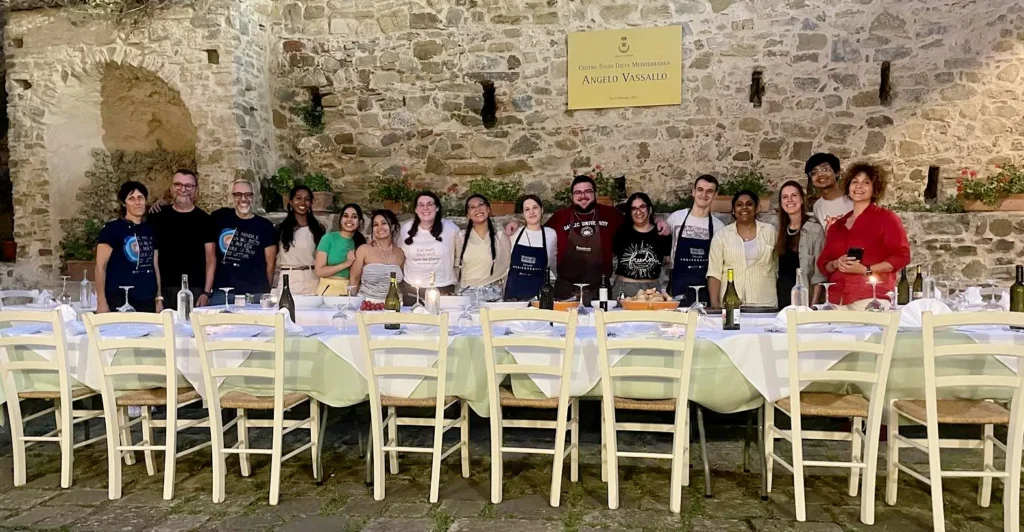From Mediterranean Roots to Regenerative Action
This past summer, while Europe battled unprecedented heatwaves and wildfires, the ancient village of Pollica, an emblematic UNESCO community of the Mediterranean Diet , became the stage for an extraordinary experiment: the 4th Climate Shapers Bootcamp on Gastrodiplomacy. Here, students from the Culinary Institute of America joined forces with food alchemists, designers, and scientists to explore a pressing question: How can food become a language of planetary healing in a time of polycrisis?
A Journey Sparked by Urgency and Purpose
Our journey began in 2019 with the FAO and support from Google, inspired by five fundamental principles shared by Michiel Bakker during his time leading Google’s Food Team:
- Enable informed food choices for sustainable lifestyles.
- Shift diets toward planetary well-being.
- Enhance transparency across food systems.
- Reduce waste at every stage.
- Accelerate the transition to a circular, regenerative food economy.
These principles placed food at the intersection of ecology, economy, and culture. However, in a world increasingly overwhelmed by disinformation, climate disruption, and economic and political instability, our approach must evolve.
Mediterranean Wisdom: A Regenerative Blueprint
More than a nutritional model, the Mediterranean Diet is a 5,000-year-old diaita , a holistic way of life grounded in:
- Biocultural diversity, through agro-silvo-pastoral systems that protect biodiversity.
- Conviviality, with meals fostering social equity and cohesion.
- Ecological harmony, via seasonal, local, and low-impact sourcing.
- Time as an ingredient, respecting natural rhythms and human well-being.
Ancel Keys’ legacy reminds us that this is a proven One Health model — sustaining human longevity and planetary resilience.
This experience was not designed in isolation — it was stitched together through the lived wisdom of those who safeguard the Mediterranean legacy every day. We learned from the Mediterranean Diet Ambassadors, regenerative farmers who nurture the soil as a living organism, beekeepers who protect biodiversity and pollination, and nutritionists who understand the intricate connections between food, health, and culture. Their voices, rooted in tradition yet projected toward the future, helped us craft an educational journey that is as nourishing as it is transformative.
Evolving Methods for a Complex World
As global challenges have intensified, so too has our commitment to regeneration. Initially, our goal was to empower communities to make sustainable choices through food. Today, we embrace a more systemic, transdisciplinary approach focused on real-world impact.
The 6S Model: A Compass for Regenerative Futures
Co-developed with Dr. Sonia Massari, our 6S Model blends Mediterranean tradition with food design, systems thinking, and co-creation:
- Senses: Deeply immersive, nature-connected learning experiences.
- Savoir-faire: Skills that merge ancestral knowledge and innovation.
- Support: Community-building and collaborative learning.
- Solidity: Localized, sustainable practices that enhance resilience.
- Sensitivity: Empathy and care for people and planet.
- Sighting: Vision-driven action and creative leadership.
Through this model, we’ve created an experiential learning ecosystem that bridges disciplines and scales change from the bottom up.
A Model Rooted in Time and Relationships
Like the Mediterranean culture itself, we recognize that time , to reflect, experiment, and connect across generations, is essential. Through initiatives like CIRCLE and the Paideia Campus, we’ve established “learning lands” that unite schools, communities, and landscapes for shared regeneration.
The Bootcamp Structure: A Systemic Approach
- Research & Framing: Addressing issues from soil degradation to “gastronativism”.
- Ideation & Prototyping: Designing experiences like climate-resilient feasts.
- Validation & Scaling: Testing innovations in real contexts, like the Castle of Pollica.
Why Gastrodiplomacy Matters Now
In a fragmented world, food offers:
- A powerful narrative: Stories that counter misinformation (e.g., a dish representing water scarcity).
- Soft power: As shown by Peru and Thailand, cuisine shapes national identity.
- Systemic leverage: With 30% of global emissions tied to food systems, rethinking food means rethinking everything.

